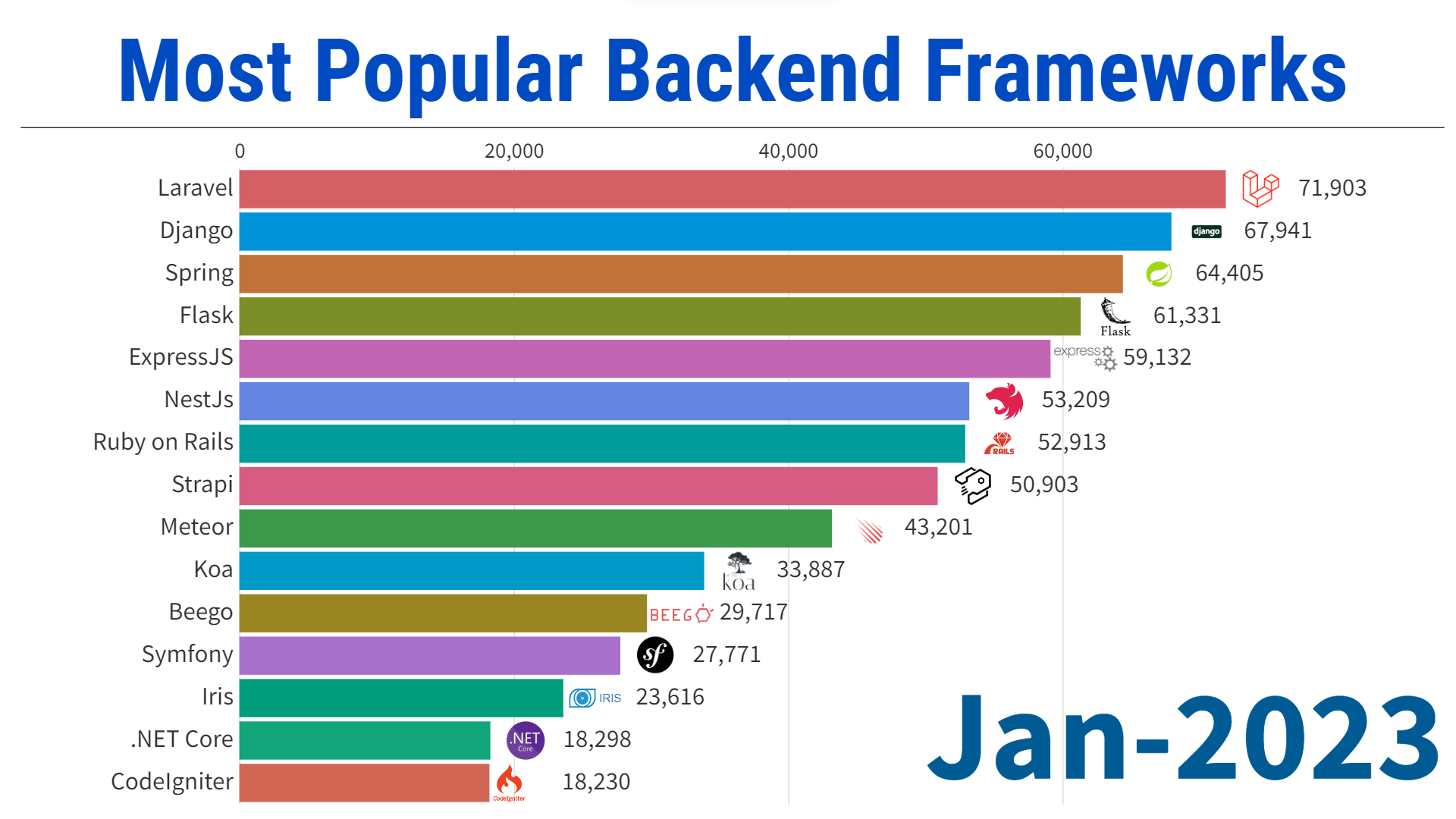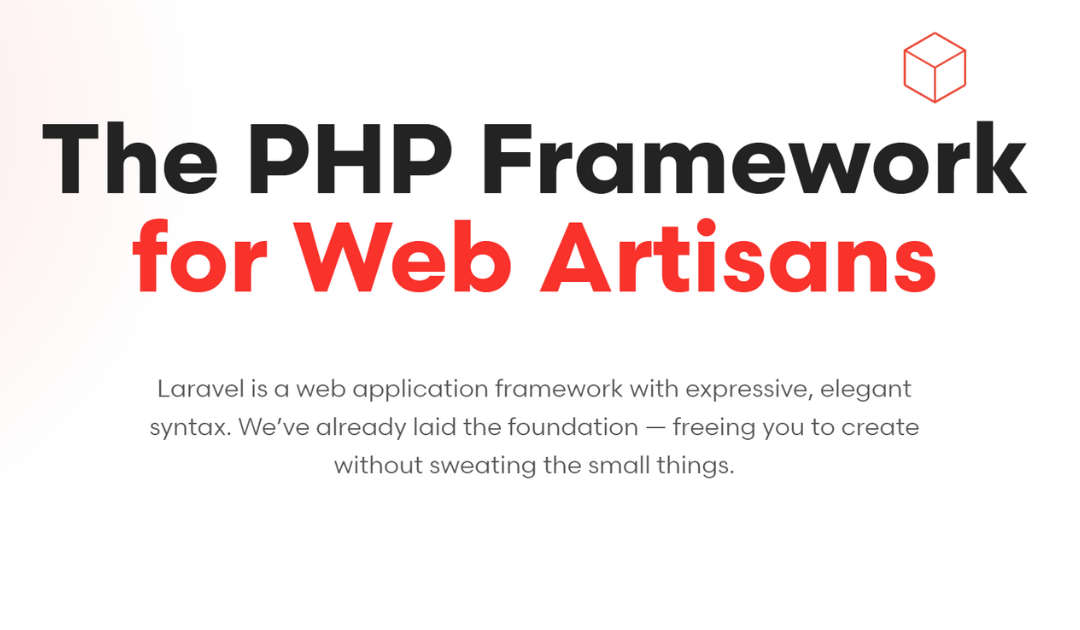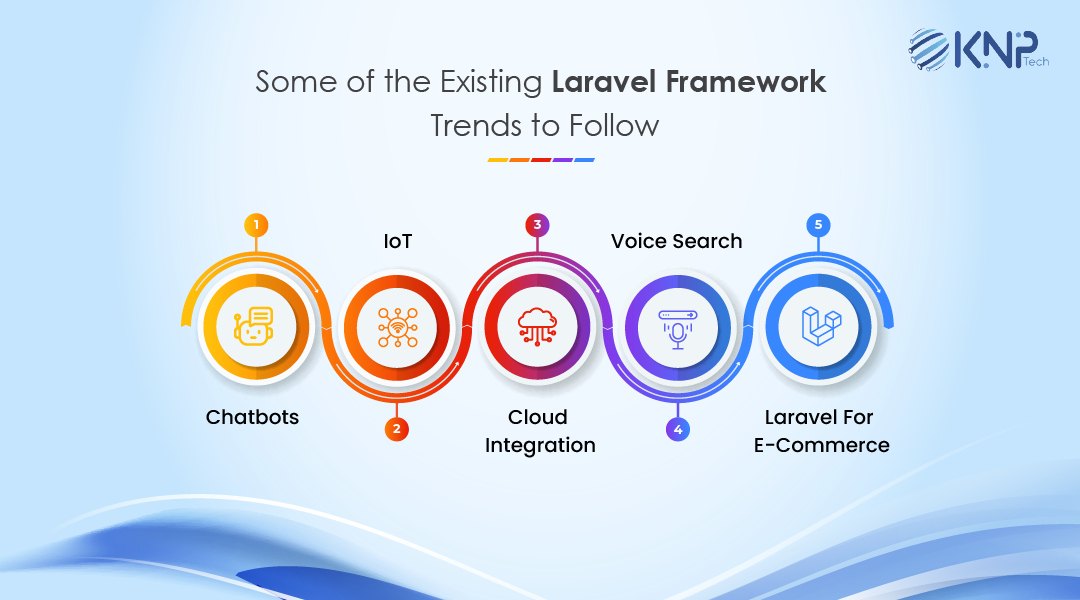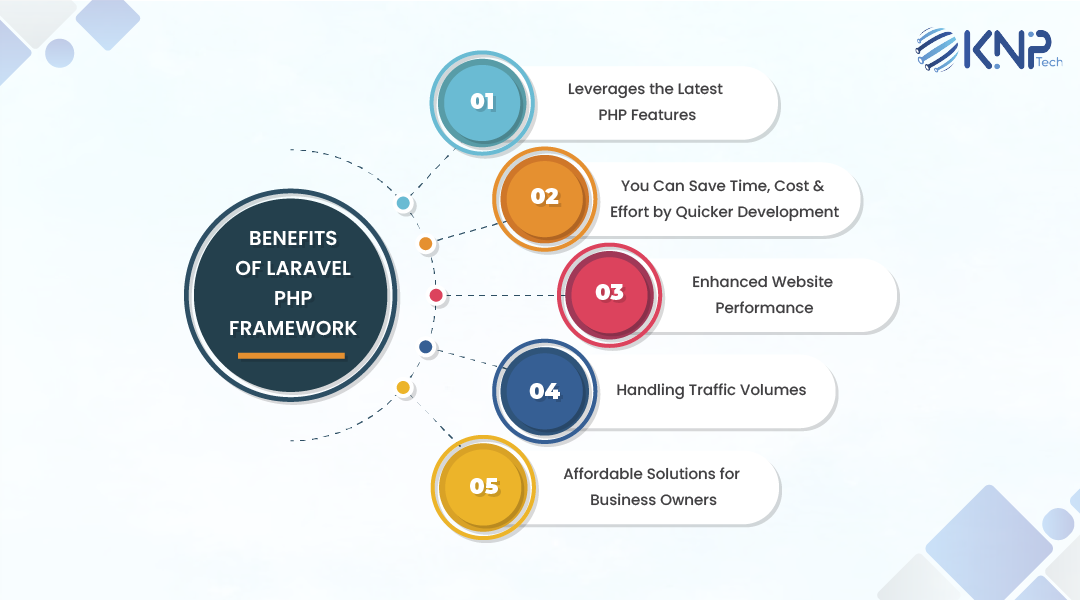Full Stack Web and Mobile Apps Development Company in India
What is Laravel Framework Benefits, Future, Trends, and Application

Author
Priyank Panchal,
October 26, 2023
Hey Reader! Do you know what is Laravel framework? Are you interested in learning more about it? This post will describe all the benefits, future trends, and applications. Sounds fun!
Let’s get started!
According to recent reports, Laravel has emerged as one of the leading PHP backend frameworks in the first month of 2023. Let’s delve deeper into this remarkable platform’s exciting facts and figures.

Now that you have gained interest in knowing more about the Laravel framework? Let’s begin with learning what a web framework is.
What is PHP?
PHP stands for Hypertext Preprocessor, which is a server-side scripting language used to power various types of internet applications, including websites and mobile app development. Essentially, it processes data sent between a client (such as a website visitor) and a server, allowing for dynamic content generation rather than static pages. The output generated by PHP scripts gets combined with HTML elements to form complete web pages before being delivered to browsers for display.
Now, let’s discuss how PHP relates to Laravel Framework. As mentioned earlier, Laravel is a PHP web application framework that simplifies backend Web Development Since Laravel leverages PHP for its core operations, there’s no way to separate their connections.
You could say they depend on one another in much the same way as a car relies on gasoline to keep running. Without PHP, Laravel couldn’t exist; conversely, if you aren’t using Laravel, nothing is preventing you from working solely with plain old PHP instead.
Either way, both technologies play crucial roles in modern web development, helping dev teams produce high-quality projects quickly and efficiently.
What is Laravel Development?
Laravel Development refers to using the PHP web framework called Laravel to build websites and applications. If you don’t know what a web framework is, think of it as a pre-built set of tools designed to simplify the tasks required when writing code for a project. In the case of Laravel specifically, these features focus primarily on making it easier to work with databases and servers to build dynamic websites.
When we talk about Laravel development, we mean using this pre-built collection of helpful utilities to construct something great online. These projects might range from basic sites to more complex web applications, such as e-commerce systems or social media networks. Laravel helps streamline the creation process so programmers can deliver quality results faster without getting bogged down by tedious coding chores. That’s why many people choose to use this popular framework when they start working on new digital ventures today.
Is Laravel Frontend or Backend?

Laravel is a backend PHP framework. Put differently, it enables developers to establish comprehensive web applications that incorporate elements usually associated with server-side programming.
These encompass tasks like managing user profiles, generating reports, organizing orders, etc. By leveraging Laravel’s capabilities, programmers can craft feature-rich applications that run smoothly on the server side while offering users a seamless experience on the front end. In other words, Laravel helps unite both sides into a coherent whole.
Some of the Exciting Laravel Framework Trends to Follow
After understanding what Laravel Framework is, let us know some critical trends in Laravel web application development that businesses, customers, and developers worldwide are embracing to maintain a leading edge in the dynamic industry landscape:
-

1. Chatbots
Well, this is a trend we all know, and once in a while, we all have used – Chatbots. Laravel web app development is on the rise, and one of the most popular trends is using AI to create conversational interfaces. Businesses may use these bots to improve their customer service and respond quickly to inquiries of all sizes.
Web applications that use chatbots provide users with direct communication with support staff without forcing them to leave the app.
-
2. IoT
Integration of Internet of Things (IoT) devices is yet another developing pattern in Laravel web application development. The Internet of Things provides organizations with a fresh angle from which to collect and evaluate data, enabling them to improve many facets of their operations.
Using the Internet of Things (IoT) sensors in conjunction with the Laravel PHP framework enables organizations to gather and send data while guaranteeing the highest possible levels of security.
-
3. Cloud Integration
As interest in cloud computing increases, more and more Laravel projects are incorporating cloud services. Businesses of all sizes and fields are beginning to use cloud services due to their many advantages.
Businesses may gain new capabilities and use flexible storage choices for sensitive data by integrating cloud services into their Laravel web projects.
-
4. Voice Search
Another key trend to look for is voice search. It is booming now. This industry will reach 35.5 billion by 2026. Businesses seeking to enhance user experience on their Laravel websites should consider incorporating AI-powered voice assistance technology.
Industries such as eCommerce, travel and tourism, food and beverages, news, and media, among others, may find voice search particularly beneficial due to its ability to increase engagement rates.
-
5. Laravel For E-Commerce
Businesses can develop very effective eCommerce systems that are in line with the requirements set out by their clients if they make use of the features offered by the Laravel PHP framework. These platforms distinguish themselves by meeting the needs of a digital world that is very competitive.
Your brand will be positioned in a manner that is unique within your sector if you use Laravel in your eCommerce strategy. This will pave the path for long-term success in today’s extremely competitive market.
The Usage of Laravel Development Services
Well, to be very honest, Laravel is not the only language that exists on earth to work on the PHP framework, but we have listed out the core reasons or major uses of Laravel development services.
Here are the key usages which, according to us, make laravel more demanding:
1. Safety and Assurance
Laravel is known for its exceptional strength in several areas, including security, which is one of the most important aspects of modern digital technology. Its authentication system is properly built and consists of two layers: the “guards” and the “providers,” both of which retain data for each session they are involved in.
Guards are responsible for allocating users who are authorized and what degree of access they receive, while providers are responsible for specifying how users are retrieved from the database. Guards may also allocate users to other guards.
Eloquent and database queries are built into Laravel, and each of these components may have their functionality readily customized to modify the way the framework gets user information. In addition to this, it offers built-in support for a wide variety of authentication and authorization operations.
2. Quick and Effective Performance
Within the context of the modern digital economy, the speed with which a user can interact with a piece of technology is the single most significant factor. When online sites take a long time to load, visitors often do not remain on such pages for more than a few seconds. As the number of mobile apps available in every region of the world rises, speed has become an even greater concern.
PHP has already had its speed tuned for it. It provides a wide variety of options for adjusting memory allocation and shortens the duration of programs that gather trash in the system. PHP 8 goes even further in this direction by introducing brand new libraries, such as the Just-In-Time compilation, which significantly improves the efficiency of the language.
Laravel’s performance has been significantly enhanced by the inclusion of functions that further improve its already impressive speed. Redis and Memcached are the functions in question, and both of these methods enhance cache server functionality.
3. Routing
Laravel has a significant edge over PHP due to the fact that its routing system is more flexible. Using the Laravel framework allows for a wide variety of approaches to be used to solve the problem.
The first option is to make use of controllers, which are pieces of software that may be programmed to do a variety of tasks for certain parts of a website. Users are spared the trouble of hosting a diverse set of controllers for every region of the website if they utilize the second method, which is called code routing. This method gives users the ability to personalize features applicable to certain parts of the website.
In addition, routing may be accomplished by utilizing host controllers located at various web extensions and then exercising control over the data that is directed to those controllers.
Don’t Miss these 7 Key Features of Laravel Framework
Laravel is a widely popular PHP web development framework packed with essential features catering to different web app development aspects.

Some of the key features include:
-
1. Easy Setup
With the help of Composer, which is a dependency management for PHP, the installation and configuration processes have been streamlined. Composer makes it simple for developers to handle the dependencies and libraries that are necessary for a project.
Laravel’s expressive syntax and user-friendly features make the development process more efficient. As a result of the increased abstraction it affords, programmers can whip up new applications more rapidly. In 2023, backend development will be more important to the evolution of contemporary online apps.
-
2. Modularity
Laravel PHP framework allows developers to write modular, reusable codes that reduce maintenance efforts and improve scalability. Furthermore, developers can use the Blade templating engine or choose from various pre-built UI kits, helping achieve quick results without sacrificing functionality.
Production and upkeep are reduced in complexity when huge projects are broken down into manageable modules. The Modules framework allows you to create reusable components for use in your application. Controllers, models, views, migration, seeders, and providers are just a few of the modules that have their settings.
-
3. Integration with Third-Party Services
Laravel developers are freed from the tedium of building external connections by the framework’s built-in compatibility with widely used services such as Amazon Web Services, MailChimp, Stripe, etc.
-
4. Authentication
The process of determining the user credentials is referred to as authentication. Sessions are responsible for managing authentication in online applications.
These sessions accept input parameters for user identification, such as email address or username and password combinations. When all of these criteria are satisfied, the user is considered to have passed the authentication test.
-
5. ORM – Object Relational Manager
Eloquent is the name of the object-relational mapper (ORM) that is included with the Laravel PHP framework. This ORM enables developers to communicate with database tables using objects rather than through raw SQL queries. This improves the codebase in terms of both its readability and its maintainability.
The Laravel framework is pre-installed with Eloquent, an object-relational mapper (ORM). An object relationship manager (ORM) is a piece of software that sits as an abstraction layer between an application’s data and the underlying database engine.
-
6. Security Features
In addition to encrypting session cookies and communications, Laravel offers cross-site scripting (XSS) filtering to protect against malicious attacks. The framework comes with middleware that checks incoming request headers and rejects suspicious inputs, reducing potential security vulnerabilities.
Laravel has a wide variety of security components, including safeguards against XSS and SQL injection, CSRF protection for form submissions, and many more. You are even able to trace every request made to your website.
-
7. Community Support
Laravel enjoys extensive community involvement and constant updates as one of the most popular PHP frameworks. Developers can leverage rich documentation, tutorials, plugins, extensions, and even dedicated YouTube channels to solve problems, learn new techniques, and get inspired while building projects.
Now that you have grasped Laravel in PHP, I have mentioned MVC in the earlier section of what Laravel is.
Benefits of Laravel Framework
Now that we are talking in depth about Laravel in PHP and what is Laravel – you must know about its following benefits.

-
1. Leverages The Latest PHP Features
Yes, Laravel PHP Framework uses cutting-edge technology to streamline web development, deployment, and maintenance processes. Many popular websites like Etsy, Reddit, and Facebook rely on Symphony as their foundation.
Furthermore, PHP Composer guarantees seamless integration between different PHP components. By leveraging these tools effectively, developers can construct efficient and reliable web systems that exceed user expectations.
-
2. You Can Save Time, Cost, and Effort by Quicker Development
Can you believe that deciding to use the Laravel PHP framework can not only save you money but it can save you time and effort?
Don’t you worry about the scalability and flexibility? Its robust application has got you covered. So, enjoy the comprehensive savings in time, cost, and effort offered by Laravel.
-
3. Enhanced Website Performance
Are you aware that using Laravel can significantly improve the performance of your website? Built-in caching helps reduce the likelihood of server crashes and speeds up page loads, making navigation smoother and more enjoyable for site visitors.
Additionally, Laravel simplifies adding further performance optimizations, like conserving memory and indexing databases.
As a result, your site becomes even more responsive and optimized. If your company places a premium on website velocity and maximizing efficiency, Laravel is definitely worth considering.
-
4. Handling Traffic Volumes
The number of people visiting your website will probably rise as your company’s success progresses. Because it was developed with scalability in mind initially, Laravel can successfully manage this growing demand without caving into the strain.
One of its primary distinguishing characteristics is a message queuing system that sorts incoming requests in order of priority. This implies that actions with a lesser priority, such as sending emails, may be placed in a queue and handled after those with a higher priority have been completed.
This guarantees that your website can effectively handle many users, even at peak periods, without sacrificing speed or responsiveness. In summary, the solid support that Laravel provides for massive visitor levels helps preserve your site’s usual running despite the many different circumstances.
-
5. Affordable Solutions for Business Owners
As an open-source project, the Laravel PHP framework is accessible to anybody. You may begin creating your project without worrying about costs once you fully grasp the structure.
Hiring a professional developer might be costly if you don’t know your way around Laravel. However, Laravel-powered projects have substantially lower total long-term expenditures than many competing frameworks because of the reduced requirement for maintenance.
Therefore, Laravel provides a low-cost alternative for business owners who wish to make a big splash in the digital world.
Conclusion
So, that’s it about the Laravel framework with its benefits, future, trends, and application. If you want to build your next project on the Laravel PHP framework – KNP Tech is the place for you.
We have over 200+ satisfied clients and 900+ projects delivered. We provide end-to-end solutions, including everything from initial consultation to final implementation and everything in between. Our team of technical professionals excels at developing superior business solutions that meet or exceed customer requirements.
Here at KNP Technologies, we know how crucial it is to anticipate and adapt to market and technological changes. If you want to know how we can make your digital dreams come true, now is the time to contact us.
–
FAQs
-
Question: 1 What is Laravel?
Answer: Laravel is a free and open-source web application framework written in PHP designed to develop web applications following the model–view–controller (MVC) architectural pattern. It offers robust functionality needed to build complex and dynamic applications at a lower cost than other frameworks.
- Question: 2 What are some benefits of using Laravel?
Answer: Laravel has numerous benefits for developers and business owners alike. Some of them include improved security via built-in protection against common attacks; simplified task automation via artisan command line tools; increased developer productivity owing to ease of use and vast pre-installed libraries; enhanced performance courtesy of inbuilt caching; simplified deployment via zero downtime updates and automatic migration management; better SEO rankings thanks to Blade templating engine support; and lastly, access to an extensive community of experienced developers who contribute to the platform’s growth and maintenance.
- Question: 3 What is the future outlook for Laravel?
Answer: Laravel is one of the fastest-growing PHP frameworks today, boasting a large and active community of developers contributing to its evolution. With its focus on modern technologies and best practices, Laravel has excellent prospects. It is expected to continue evolving alongside new trends in web development and remain popular among developers seeking to build world-class web applications.
- Question: 4 What are some current trends shaping Laravel development?
Answer: Several current trends are influencing Laravel development. First, there is a shift towards progressive web apps (PWAs), which aim to combine the benefits of desktop and mobile experiences within a single application. Second, headless WordPress sites are gaining traction, which decouples frontend and backend functionalities to create more performant and secure websites.
- Question: 5 How does Laravel prioritize the security of web applications?
Answer: Laravel emphasizes security by incorporating features such as securely storing hashed passwords, protecting against CSRF attacks defending against SQL injection and cross-site scripting threats. Additionally, Laravel offers authorization mechanisms, encryption capabilities, and secure user authentication to ensure the safety of web applications.
- Question: 6 What does the future hold for Laravel?
Answer: What emerging trends can we expect in its development? The future of Laravel looks promising with a community and continuous updates. Some anticipated trends include the growing usage of Laravel Livewire for real-time functionalities, advancements in Laravel Sanctum for API authentication, and the evolution of Laravel Vapor for serverless deployment.
- Question: 7 In which scenarios is Laravel commonly used? Is it adaptable for large-scale projects?
Answer: Due to its adaptability and versatility, Laravel finds applications in scenarios ranging from projects to extensive enterprise-level applications. It excels well in content management systems (CMS) e-commerce platforms, and custom web applications. The modular architecture and scalability of Laravel make it well-suited for projects of different sizes.
- Question: 8 In which scenarios is Laravel commonly used? Is it adaptable for large-scale projects?
Answer: Due to its adaptability and versatility, Laravel finds applications in scenarios ranging from projects to extensive enterprise-level applications. It excels well in content management systems (CMS) e-commerce platforms, and custom web applications. The modular architecture and scalability of Laravel make it well-suited for projects of different sizes.
- Question: 9 What advantages does Laravel offer for web development projects?
Answer: Laravel offers a range of advantages, including its easy-to-understand syntax, flexible packaging system, integrated testing capabilities, and powerful Eloquent ORM for seamless database operations. It helps speed up development, simplifies tasks, and promotes the production of manageable code.
